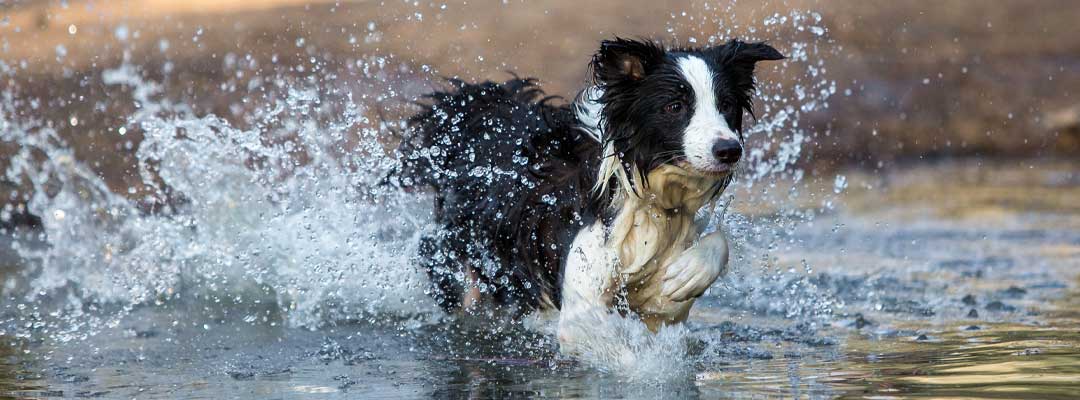What You Need to Know About Leptospirosis in Dogs
Leptospirosis in dogs is harmful to their health, as well as your own. Learn how to identify leptospirosis symptoms in dogs and much more.

Whether dogs take a sip from a water puddle, take a dip in the creek, or carry the carcass of who knows what from who knows where, all of these dog-favoriting activities have one thing in common---they each present risk for contracting Leptospira bacteria. Whether a ranch dog, hunting dog or a lap dog, all dogs deserve to be protected against leptospirosis.
“Leptospirosis is a bacterial disease that exists across the world, and we see it quite a bit,” said Lara Sypniewski, DVM, DABVP, CVA, CCRP Patricia Henthorne Clinical Professor of Small Animal Medicine at Oklahoma State University’s College of Veterinary Medicine. Found worldwide, leptospirosis disease (also known as lepto) is caused by infection with Leptospira bacteria, which are found in contaminated soil and water. Urine from infected wildlife serves as the primary source of infection, permeating the environment and in turn, infecting animals and even humans---leptospirosis disease is zoonotic, meaning that it is transferrable to humans.

Why is protection against leptospirosis disease in dogs also critical to human health?
The bacteria Leptospira can pose great risk to humans, as well as animals. As many as 150 cases in humans are reported annually in the United States, often occurring after heavy rainfall and flooding or within living conditions with sanitation concerns, according to Centers for Disease Control and Prevention (CDC). Leptospirosis in humans can present “a devastating side effect,” cautions Dr. Sypniewski. Leptospirosis during pregnancy can cause fetal complications, including fetal death. Other symptoms can range from the mild, such as fever and headache, to the severe such as jaundice, renal failure and hemorrhage, with fatality rates reaching 50%, reports the CDC. “It’s a very scary disease and nasty bacteria,” Dr. Sypniewski said.
How are dogs infected by the disease?
Lepto in dogs is far more commonly seen than lepto in cats. And while dogs are often nose-to-the-ground, sniffing out their next adventure, they are certainly not actively seeking potentially harmful Leptospira bacteria; however, they can unfortunately contract Leptospira bacteria through a number of everyday activities, like:
Are some dogs at higher disease risks than others?
In truth, “Every dog is exposed, and those less likely to be vaccinated are the most likely to get the disease,” said Dr. Sypniewski. “At the OSU Veterinary Hospital, the most common dog we have seen infected with Leptospirosis has been the Dachshund, which is not the dog you would first think of, like a duck dog, hunting dog or dock diver. This is likely because people may have avoided vaccinations because [the breed] was thought to be sensitive to vaccines.”
While hunting dogs and cattle dogs may spend more time outdoors roaming rural property, even city and suburban homes have the occasional visit from wildlife, thus lepto risk remains for all dogs. “Why take a chance on your dog getting a potentially fatal disease?” asks Dr. Sypniewski. If your dog checks off any of the following, make sure he is vaccinated against leptospirosis.
What are common leptospirosis symptoms in dogs?
Signs of lepto in dogs can vary pet-by-pet, with some never presenting symptoms, some recovering quickly or others becoming very sick --- or worse. Early treatment with antibiotics can increase chances of recovery; ensure you are aware of common signs:
| Fever | Muscle Soreness |
| Shaking | Vomiting |
| Dehydration | Lethargy |
| Increased Thirst | Inflammation of the eyes |
| Diarrhea | Kidney/liver failure |
| Loss of appetite | Difficulty breathing |
Can the spread of Leptospirosis be prevented?
“Unfortunately, spread of the bacteria within the environment cannot be prevented, and Leptospira bacteria can live for months in water and soil. Vaccination is the best bet to help prevent this disease,” said Dr. Sypniewski.
How can pets be protected against this disease?
Leptospirosis vaccines for dogs are available to offer them the ultimate protection. The American Veterinary Medical Association recommends annual vaccinations for at-risk pets. Dr. Sypniewski recommends visiting with your veterinarian to determine whether your dog is at heightened risk for the disease. Vaccination is especially important for any outside dogs, ranch dogs and hunting companions, who can have higher chances of coming in contact with infected environmental sources. Veterinarians may recommend high-risk dogs be vaccinated twice-annually. In addition to vaccination, help alleviate disease risk by reducing exposure to potentially infected areas.
Is treatment available for dogs with leptospirosis?
Luckily, leptospirosis disease in dogs can be treated. “The antibiotic Doxycycline helps rid leptospirosis bacteria in blood and also helps prevent shedding in urine,” said Dr. Sypniewski. “It’s important to treat early, as early treatment will save the dog, and treatment will stop them from shedding the bacteria in urine, so humans and other dogs don’t come in contact with that urine.”
Should your dog be infected with leptospirosis, your veterinarian will take swift steps for treatment with Doxycycline. “Treatment is very effective,” said Dr. Sypniewski, who also asks for pet lovers seeing leptospirosis symptoms in dogs to please be patient with their veterinarian. “The testing for lepto for a dog that is sick can be tough, and they may need to run different tests to verify that it is leptospirosis. Sometimes, it is not an easy answer, but we can trust the process,” she said.
Whether a ranch dog, hunting dog or a lap dog, all dogs deserve to be protected against leptospirosis. Vaccinate your pet to help shield him against risk. You can find a selection of lepto vaccines for dogs available from veterinarian-founded Valley Vet Supply to help protect your pet. If you are concerned you may be seeing leptospirosis symptoms in dogs whom you love, schedule an appointment with your veterinarian immediately, so they can provide your pet with expedient care and treatment.


